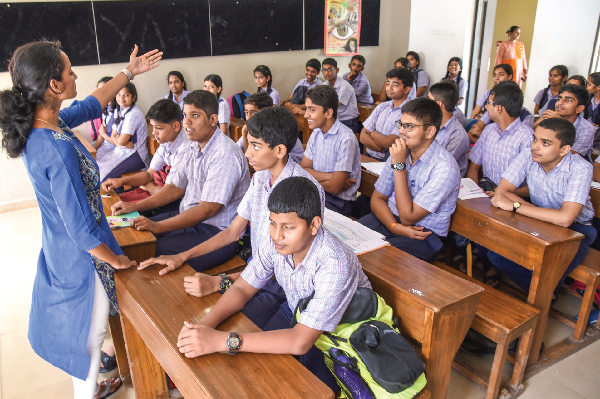The Lok Sabha has passed the Right of Children to Free and Compulsory Education (Second Amendment) Bill 2017, ending the no-detention policy. What does it hold for the future of education? Academics and teachers around Goa reflect

Jay Joshi
The Lok Sabha passed the RTE (Second Amendment) BIll 2017, ending the no-detention policy till class VIII. The new amendment provides for a regular examination in class V and class VIII, allowing the school to detain the students if they fail the exam. The no-detention policy was introduced fearing that being detained in one class is de-motivating for students and leads them to drop out of schools. However, while presenting the Bill in Lok Sabha, HRD Minister Prakash Javadekar stated that schools today have become only centers for mid-day meal and learning and education is missing. Our education system is broken and we need to rebuild it, the minister added. The new amendment has now opened a debate among educationists and academics.
Teachers and educationists across Goa reflected a broad spectrum of views regarding the change. “Cancelling the no-detention policy is a good development. Earlier when students were being promoted to class VIII without exams, the students did not study seriously, because they knew they wouldn’t face any challenges up to class VIII” says Gajanan Mandrekar, Principal of Shree Ganesh Vidya Mandir Mapusa “But as a result, we had many students in class IX who did not even understand the basic concepts. Thus, the rate of detention in class IX suddenly rose. Reversal of the policy should now bring some seriousness and improve the quality of students.”
Mangala Karapurkar, former Headmistress of Mahila Nutan HS, Margao agrees, but holds that no-detention policy itself is not entirely to blame for the state of affairs today. “There was nothing wrong with the no-detention policy itself. It is just that it wasn’t properly implemented. Due to skewed teacher-student ratio, it was not possible for teachers to provide individual attention to students, and that is what led to the failure of the policy.” says the veteran teacher. “Plus, the students were suddenly faced with a higher load of study in class IX. Exams are a must to test the child’s understanding of the concepts” she adds. “I have had parents take their class VII wards out on tour during exams because they thought the child would advance to next class anyway so what’s the use of taking exams so seriously. Such attitudes should not prevail.”
Educationist Dr Narayan Deasi on the other hand believes that introducing or reversing policies such as no-detention will not make any difference unless we improve the quality of teachers. “The key is to raise the quality of education, to improve the quality of curriculum transaction from teacher to student, and the teacher-student ratio.” says the former teacher. “We need better ways to measure learning outcomes at the school level.” Further on, he does not exactly see any merit in reintroducing exams. “I still wonder how any child can be judged on what he writes in exams. We need to also judge children on values, character, personality etc. For this, we need skilled teachers who can learn the nature of the children and encourage the students to learn rather than scaring them with failure in exams.” says Dr Desai.
Bhaskar Nayak, the former Director of Higher Education too feels that our education system should be capable of offering the students all-round development rather than judging them solely on exams. “No-detention does not just mean promoting everyone to the next class. It means preparing everyone so that all students are at an equal level of learning. There is a difference between promoting everyone and bringing everyone up to a level where they could pass the test. The latter involves a lot of initiative on the part of the system, like giving remedial classes to weaker students. It should increase the capability of students -that was the objective behind the no-detention policy” says the former bureaucrat. “ The industry does not place a high premium on your exam scores today. They consider factors such as soft-skills, communication skills and so on when hiring.” he adds, underlining the irrelevance of exams today.